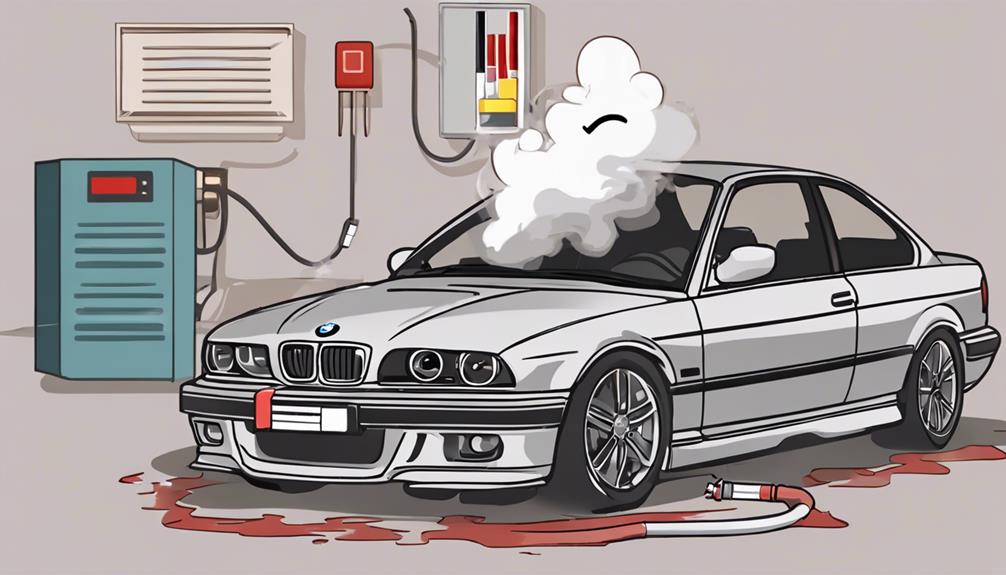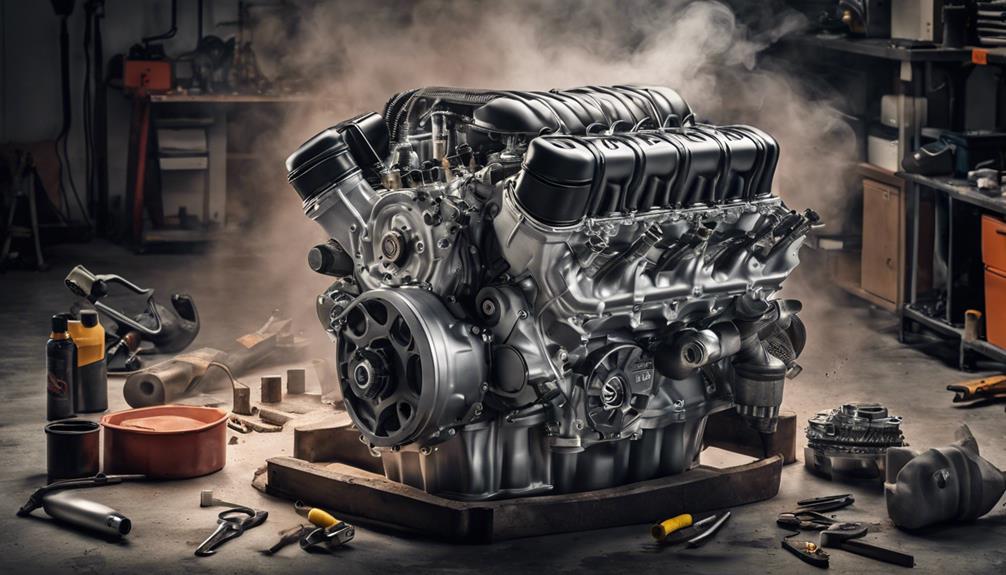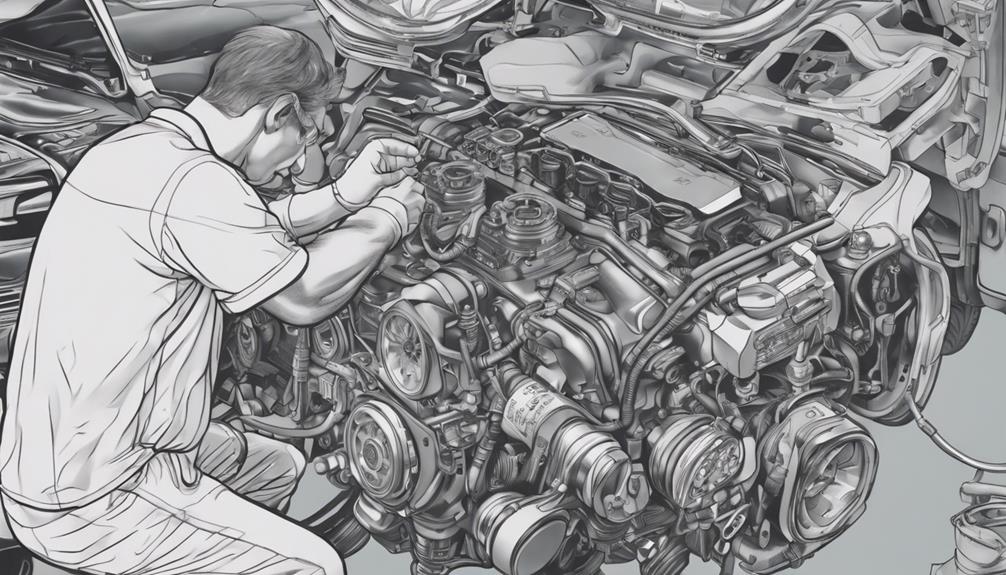If you're experiencing transmission problems with your BMW 325ci, watch out for signs like strange RPM fluctuations, grinding noises, or delayed gear shifting. Keep an eye out for leaks indicated by reddish-brown fluid, especially from the transmission pan gasket or seals. Promptly addressing these issues can prevent costly damage. Understanding gear shifting difficulties and burning smells can help protect your vehicle. Listening for specific transmission noise types and checking fluid levels are important steps. Prioritizing regular maintenance can prolong your 325ci's life and prevent major problems down the line.
Key Takeaways
- Unusual RPM fluctuations could signal transmission issues.
- Address grinding sounds promptly for potential transmission problems.
- Delayed response when shifting gears may indicate transmission troubles.
- Regularly check transmission fluid for proper maintenance.
- Dark or burnt-smelling fluid suggests overheating or contaminants in the transmission.
Common Warning Signs of Transmission Problems

If you notice unusual RPM fluctuations, grinding sounds, or delayed response when shifting gears, these could be common warning signs indicating potential transmission problems in your BMW 325ci.
One critical aspect to take into account when faced with these issues is the level and condition of your transmission fluid. Transmission fluid acts as a lubricant, coolant, and cleaning agent within the transmission system. Insufficient or contaminated fluid can lead to overheating, increased friction, and ultimately, transmission failure. Regularly checking the transmission fluid level and quality is crucial in maintaining the health of your BMW 325ci's transmission.
Proper transmission fluid levels guarantee smooth gear shifts and efficient power transmission throughout your vehicle. Dark or burnt-smelling fluid may indicate overheating or the presence of contaminants, necessitating a fluid flush and replacement. Neglecting transmission fluid maintenance can result in irreversible damage to your transmission components.
Addressing any abnormalities in transmission fluid color or level promptly can prevent costly repairs and prolong the lifespan of your BMW 325ci's transmission.
Transmission Fluid Leaks and Solutions
If you notice reddish-brown or bright red fluid under your BMW 325ci, it could indicate a transmission fluid leak. Distinguishing this from coolant leaks, which have different colors, is important for accurate diagnosis.
Promptly addressing leaks through professional inspection and repairs is essential to prevent further damage to your transmission.
Common Leak Locations
Common leak locations for transmission fluid leaks in BMW 325Ci models include the transmission pan gasket, torque converter seal, and cooler lines. In addition, leaks can stem from the input and output shaft seals, leading to fluid dripping onto the ground or forming a puddle beneath the car.
It's essential to promptly address these leaks to prevent damage to the transmission system and maintain peak performance. Identifying the source of the leak through visual inspection or using UV dye can aid in determining the necessary repairs or replacements.
Properly sealing or replacing the affected components is key to resolving transmission fluid leaks in BMW 325Ci models. Regular maintenance and vigilance can help prevent these leaks from occurring and ensure the longevity of your vehicle.
Repair and Prevention
To effectively address transmission fluid leaks in your BMW 325Ci, timely attention and proper repairs are essential to maintain the integrity of the transmission system. When you notice reddish-brown or bright red fluid leaks, it's important to distinguish them from coolant leaks, which appear pink, yellow, or green. Immediate action is necessary to prevent further damage. Visit a service center promptly for a thorough inspection to identify the source of the leak. Proper repairs and replacements are crucial in resolving BMW 325Ci transmission fluid leaks. Ensuring the transmission system operates smoothly and efficiently. Below is a table outlining common solutions for addressing transmission fluid leaks:
| Solutions | Description | Benefits |
|---|---|---|
| Replace damaged seals | Prevents fluid leakage and maintains transmission performance | Extends the lifespan of the transmission system |
| Check transmission pan gasket | Ensures a proper seal to prevent leaks and maintain fluid levels | Prevents damage to transmission components |
| Monitor fluid levels | Regularly check fluid levels to detect leaks early and prevent transmission damage | Preserves the integrity of the transmission system |
Understanding Gear Shifting Issues

If you experience difficulty shifting from first to second gear in your BMW 325Ci, it could be indicative of underlying gear slipping causes.
Understanding the significance of transmission fluid in lubricating and maintaining smooth gear shifts is essential for diagnosing gear shifting issues accurately.
Analyzing these factors can help you pinpoint and effectively address gear shifting problems in your BMW 325Ci.
Gear Slipping Causes
When experiencing gear slipping in your BMW 325ci, a malfunctioning transmission computer may fail to signal proper gear shifts, leading to inconsistent power delivery. This issue can be concerning and compromise your driving experience, potentially causing hazardous situations on the road. It is important to address gear slipping promptly by contacting your dealership to guarantee your safety and prevent further damage to the transmission system. Timely resolution of gear slipping problems is vital for maintaining excellent driving performance. Immediate attention and repair are necessary to rectify gear slipping issues effectively. Below is a table summarizing the reasons for gear slipping in your BMW 325ci:
| Causes of Gear Slipping |
|---|
| Malfunctioning transmission computer |
| Worn-out clutch components |
| Low transmission fluid levels |
Transmission Fluid Importance
Addressing gear slipping issues in your BMW 325ci requires a keen understanding of the importance of transmission fluid, particularly in relation to smooth gear shifting.
- Regular Changes: Changing transmission fluid is essential for top performance.
- Proper Lubrication: Fresh fluid guarantees components are well-lubricated.
- Cooling Effect: Transmission fluid helps in cooling vital parts.
- Preventing Damage: Old or contaminated fluid can lead to transmission issues.
- Hydraulic Function: Transmission fluid facilitates gear engagement smoothly.
Keeping up with fluid changes and ensuring the filter is clean can significantly impact your BMW's gear shifting experience. Regular maintenance of the fluid and filter is key to a well-functioning transmission system.
Impact of Burning Smell in BMW
Amidst the distinct aroma of burning in your BMW 325ci, the transmission system may be signaling an important issue that requires immediate attention. A burning smell in your BMW is often a warning sign for transmission problems, indicating potential overheating or old, burnt transmission fluid.
Ignoring this red flag could lead to severe damage within the transmission system, resulting in costly repairs. It's essential to take prompt action by visiting a repair shop to diagnose and address the root cause of the burning smell.
Regular maintenance plays a key role in preventing major transmission issues associated with this odor. By addressing the burning smell promptly and maintaining your transmission system, you can protect your BMW 325ci from further deterioration and prolong its longevity on the road.
Transmission Noise Troubleshooting

Identifying specific sounds like whining, humming, or clunking is important in troubleshooting transmission noise. When encountering such noises in your BMW 325ci, it's vital to take action promptly to prevent further damage. Here are some steps to help you address transmission noise effectively:
- Listen attentively: Pay close attention to the type of noise your transmission is making.
- Check fluid levels: Low or dirty transmission fluid can lead to unusual sounds.
- Consult a mechanic: Professional diagnosis can pinpoint the root cause of the noise.
- Address issues promptly: Contact us for timely repairs to prevent costly damage.
- Maintain your vehicle: Regular maintenance can help prevent transmission problems.
Importance of Timely Transmission Repairs
Timely transmission repairs are crucial for maintaining the health and performance of your BMW 325ci. Ignoring transmission issues can have detrimental effects not only on the transmission system but also on the engine. When transmission problems are left unaddressed, they can escalate, causing further damage that may lead to expensive repairs and compromise your safety on the road. By addressing these issues promptly, you can't only guarantee the longevity of your vehicle but also prevent the need for a complete transmission replacement in the future.
Regular maintenance, including checking and changing the engine oil, can play a significant role in the health of your transmission. Engine oil helps lubricate the moving parts within the transmission, reducing friction and heat buildup. This preventative measure can contribute to the overall performance and efficiency of your BMW 325ci.
Remember that investing in timely transmission repairs can save you both time and money in the long run.
Transmission Overheating Concerns

To prevent transmission overheating in your BMW 325ci, monitoring fluid levels and regular maintenance are essential practices. Here are some key points to take into account:
- Fluid Levels: Check transmission fluid levels regularly to make sure they're within the recommended range.
- Cooling System: Maintain the cooling system to prevent overheating, as it can lead to transmission issues.
- Driving Conditions: Be mindful of driving conditions that can strain the transmission, such as towing heavy loads or stop-and-go traffic.
- Warning Signs: Pay attention to warning signs of transmission overheating, such as a burning smell or sluggish gear shifts.
- Immediate Action: If you detect any signs of overheating, address the issue promptly to prevent further damage and costly repairs.
DIY Tips for Transmission Maintenance
For effective transmission maintenance at home, prioritize regular checks on fluid levels and adhere to manufacturer-recommended guidelines for fluid changes. Proper fluid maintenance is vital for ensuring the longevity and peak performance of your transmission. Here are some DIY tips to help you maintain your transmission effectively:
| Transmission Maintenance Tips | Description |
|---|---|
| Check Fluid Levels Regularly | Ensure the transmission fluid is at the right level to prevent damage. |
| Monitor Fluid Quality | Inspect the color and smell of the fluid for signs of contamination or degradation. |
| Follow Manufacturer Guidelines | Use the recommended type of fluid and adhere to the suggested change intervals. |
| Change Fluid and Filter | Regularly replace the transmission fluid and filter to keep the system clean. |
| Conduct Routine Inspections | Look for leaks, unusual noises, or vibrations that may indicate transmission issues. |
Frequently Asked Questions
How Do I Know if My BMW Transmission Is Bad?
Pay attention to RPM fluctuations, revving noise, and torque converter issues. Look out for shifting problems, transmission light coming on, and concerns when accelerating quickly. Monitor gear oil changes and seek advice to determine your BMW 325ci transmission health.
What Is the Transmission Warning on a Bmw?
When you see the transmission warning on a BMW, it's an important signal indicating potential transmission issues. Seek professional help promptly to diagnose and fix problems. Ignoring this warning can lead to costly repairs.
How Long Will a BMW Transmission Last?
With proper maintenance and care, your BMW transmission can last between 150,000 to 250,000 miles. Regular fluid changes every 50,000 miles are essential for longevity. Your driving habits, maintenance diligence, and component quality affect its lifespan.
What Causes Transmission Malfunction on Bmw?
When your BMW transmission malfunctions, common culprits like TCC solenoid issues or turbine seal concerns may be at play. Neglecting maintenance, both electrical and mechanical problems, can also contribute. Regular checks are crucial.
Conclusion
If you're facing transmission problems with your BMW 325ci, it's crucial to tackle them promptly to avoid further damage and costly repairs.
By recognizing warning signs, checking for leaks, understanding gear shifting issues, and addressing any burning smells or unusual noises, you can safeguard against potential transmission failures.
Regular maintenance and timely repairs are key to keeping your BMW running smoothly and efficiently.
Don't overlook these issues – take steps to guarantee the longevity of your vehicle.









